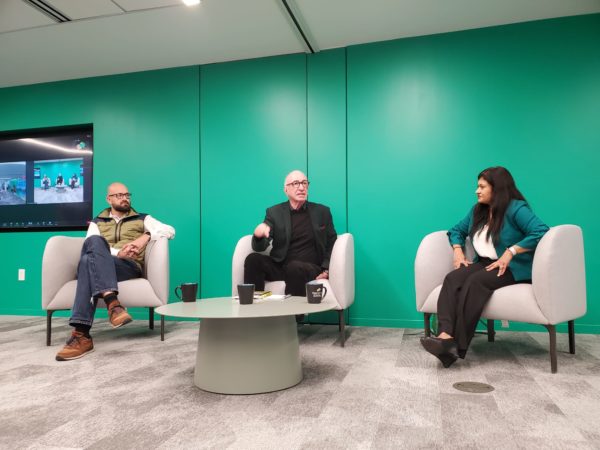
The relationship between promoting transparency and the survival of democracy is a crucial topic today, with the rise in authoritarian leaders who are either protected by “enablers” or rose to power due to corruption scandals. This is the primary topic of a newly released book by PTF Co-founder and Board Chair Frank Vogl, The Enablers: How the West Supports Kleptocrats and Corruption – Endangering Our Democracy. PTF hosted a launch event for the book on November 17 at the Open Gov Hub in Washington DC. Vogl was joined by Shruti Shah, President and CEO of Coalition 4 Integrity, and Johannes Tonn, Director of Integrity and Anti-Corruption at Global Integrity, for a discussion on important topics of the book.
The three participated in a “fireside chat,” about the book, discussing key themes and sharing experiences from their own careers in anti-corruption work. The book primarily examines the people that assist and facilitate corruption around the world, “the enablers.” This was one of the themes discussed by the participants. As Vogl stated, “[The enablers] are the facilitators of aiding and abetting the transfer of staggering amounts of money.” The book also explores the complicity of Western entities, such as banks, that have helped in the process of money laundering and other parts of corrupt schemes in the developing world. The panel also emphasized the widespread and pervasive nature of corruption. Referencing the Pandora and Paradise Papers, Tonn said these scandals “just corroborate that there is so much corruption… We live in a world in which there is such a vast dimension of corruption affecting us and preventing governments from spending on service delivery.”
This explains how corruption affects the lives of everyday people. He used the example of Greece, and why banks lent money to the country despite knowing that it couldn’t repay the sum. According to Vogl, “This is the point of the story: they [bankers] didn’t care about corruption. They weren’t interested if the money couldn’t be repaid, because they were investing the money on behalf of their clients.” Ultimately, corruption did not simply enrich the Greek government, but hurt the people of Greece, who were plunged in an economic crisis as a result of these deals. Vogl also added, “they didn’t care about the suffering of so many people as a result of default on the debt.” This led to a discussion on default, and how bankers lend to the governments of countries that pursue corruption, leading to recessions and other significant impacts to the lives of their citizens.
With the Summit for Democracy on December 9-10, 2021, this discussion provided an opportunity to promote policies to improve transparency and fight corruption. Vogl emphasized that the Summit for Democracy “cannot just be a talking shop…we absolutely need concrete actions.” To address corrupt practices across the world such as embezzlement, money laundering, and more, it is important to understand the cogs that allow machines of systematic corruption to keep moving. It is essential to fight corruption, while also acknowledging its victims, who should remain at the heart of discussions and plans to counter corruption.
Watch the full recording of the event below.
Join the conversation on social media:
On Twitter: @PTFund
On Facebook: Partnership for Transparency
On LinkedIn: Partnership for Transparency

